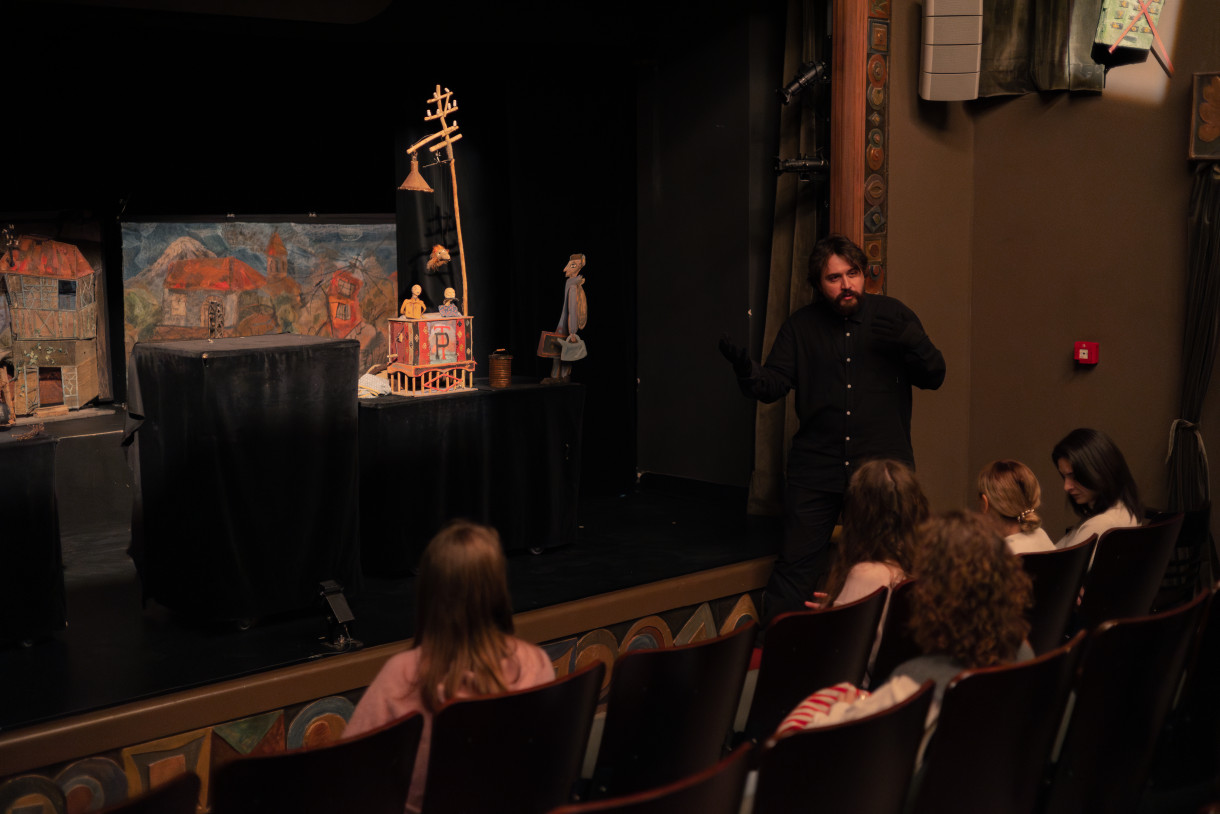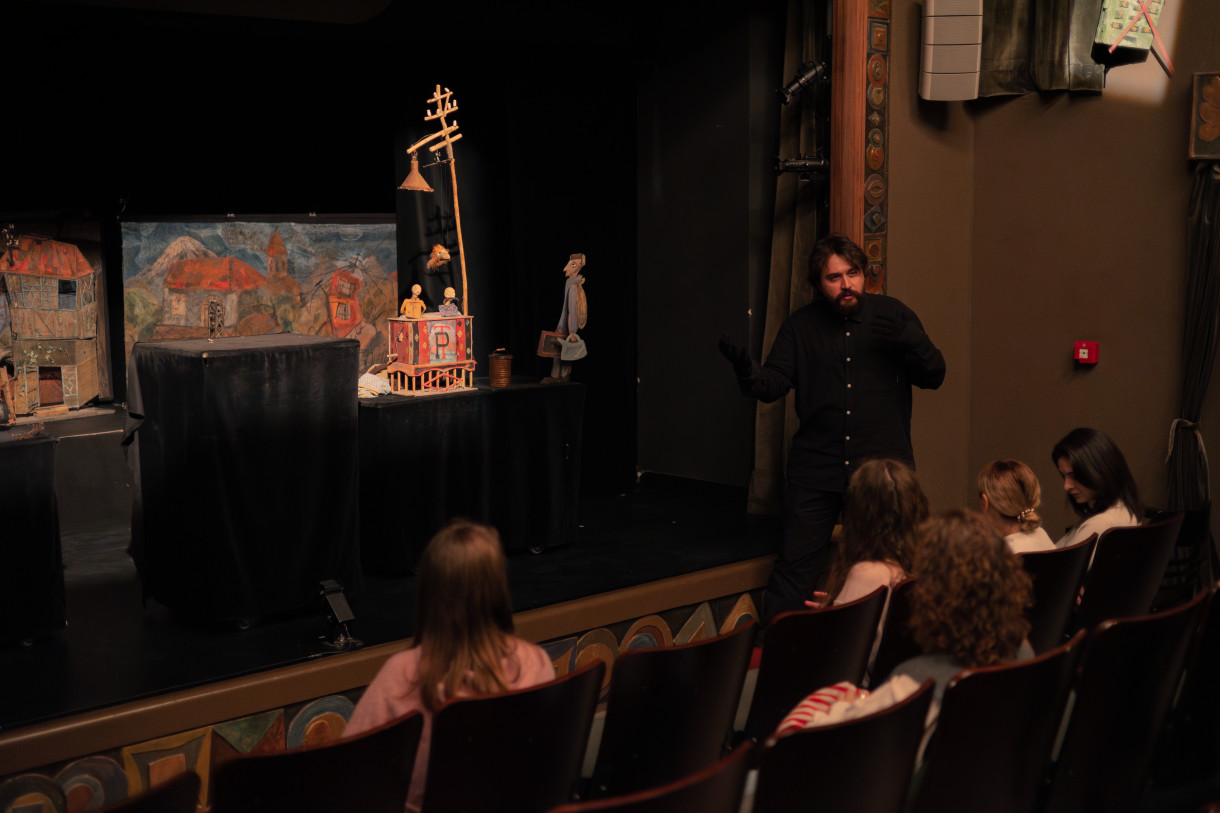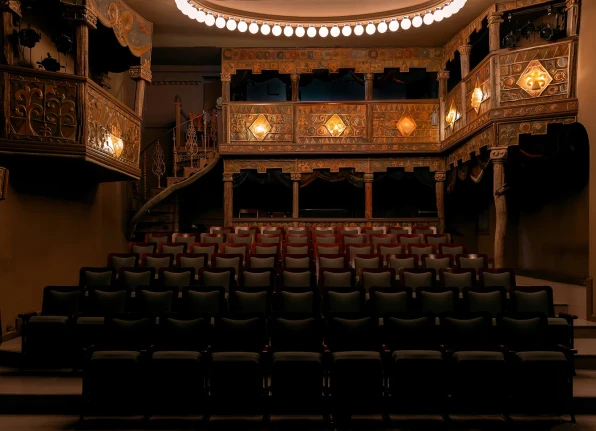 Menu
Menu
-
Experiences
-
Experiences
-
Posters
Menu
-
Categories
-
Places
Menu
- Galleries LICHT Gallery ExpoGeorgia IArt Gallery Dimitri Shevardnadze National Gallery Tbilisi Digital Space
- City sites Mtatsminda Park Mziuri Park Vake Park April 9 (Alexander) garden Shota Rustaveli Avenue
- Children's studios Creative center Art BOOM Tamashobana Happy Kids Art Club Ferdinand farm GinGer
- Ecclesiastical institutions Tbilisi Yoga Loft TBILISI YOGA VILLA Transcendental Meditation Georgia Lumos Yoga Cave
- Event spaces KERA Space Gardenia Shevardnadze Orbeliani Bazaar Fabrika bibliotheque_tbilisi
- Cafe-restaurants Blue Fox Restaurant Tsiskvili Utskho 8000 Vintages Wasserstrasse
- Cinemas Amirani Cinema Cavea City Mall Saburtalo Cavea Grand Mall Cavea Tbilisi Mall Cavea East Point Cavea Galleria
- Concert halls Kakhidze Music Center Monohall MONUMENT Tbilisi Concert Hall Tbilisi Sports Palace
- Lecture halls Terminal Auditoria Colab TBC Concept PRANA
- Museums Georgian Museum of Fine Arts Georgian National Museum Experimentorium Holoseum Zurab Tsereteli Museum of Modern Art
- Nightclubs/bars Love Bar Underwheel club Dedaena Bar KHIDI MTKVARZE
- Educational institutions Institut Français de Géorgie Beka's School BTU The Thinking Academy Japanese Language & Culture Center
- Public organizations Georgian Historic Vehicles Association Georgian-Ukrainian platform (Ukrainian House) The Samaritan Association of Georgia Blood Bank
- Hotels Tbilisi Hills & Residence Pullman Tbilisi Axis Towers Stamba Hotel Sheraton Grand Tbilisi Metechi Palace Holiday Inn Tbilisi
- Sports grounds Dinamo Arena Mikheil Meskhi Stadium Hippodrome Lisi Lake Lilo Arena Paichadze Stadium
- Theaters Nodar Dumbadze Theater (ნოდარ დუმბაძის თეატრი) Tbilisi Circus Royal District Theatre Griboedov Theatre Gabriadze Theatre
-
Categories
-
Posters
-
Categories
-
Places
Menu
- Galleries LICHT Gallery ExpoGeorgia IArt Gallery Dimitri Shevardnadze National Gallery Tbilisi Digital Space
- City sites Mtatsminda Park Mziuri Park Vake Park April 9 (Alexander) garden Shota Rustaveli Avenue
- Children's studios Creative center Art BOOM Tamashobana Happy Kids Art Club Ferdinand farm GinGer
- Ecclesiastical institutions Tbilisi Yoga Loft TBILISI YOGA VILLA Transcendental Meditation Georgia Lumos Yoga Cave
- Event spaces KERA Space Gardenia Shevardnadze Orbeliani Bazaar Fabrika bibliotheque_tbilisi
- Cafe-restaurants Blue Fox Restaurant Tsiskvili Utskho 8000 Vintages Wasserstrasse
- Cinemas Amirani Cinema Cavea City Mall Saburtalo Cavea Grand Mall Cavea Tbilisi Mall Cavea East Point Cavea Galleria
- Concert halls Kakhidze Music Center Monohall MONUMENT Tbilisi Concert Hall Tbilisi Sports Palace
- Lecture halls Terminal Auditoria Colab TBC Concept PRANA
- Museums Georgian Museum of Fine Arts Georgian National Museum Experimentorium Holoseum Zurab Tsereteli Museum of Modern Art
- Nightclubs/bars Love Bar Underwheel club Dedaena Bar KHIDI MTKVARZE
- Educational institutions Institut Français de Géorgie Beka's School BTU The Thinking Academy Japanese Language & Culture Center
- Public organizations Georgian Historic Vehicles Association Georgian-Ukrainian platform (Ukrainian House) The Samaritan Association of Georgia Blood Bank
- Hotels Tbilisi Hills & Residence Pullman Tbilisi Axis Towers Stamba Hotel Sheraton Grand Tbilisi Metechi Palace Holiday Inn Tbilisi
- Sports grounds Dinamo Arena Mikheil Meskhi Stadium Hippodrome Lisi Lake Lilo Arena Paichadze Stadium
- Theaters Nodar Dumbadze Theater (ნოდარ დუმბაძის თეატრი) Tbilisi Circus Royal District Theatre Griboedov Theatre Gabriadze Theatre
Posters
-
Categories

Machines of Time and Mechanisms of Memory
Machines of Time and Mechanisms of Memory
13, Ioane Shavtelis St., Tbilisi
Ticket price
from70 ₾
08.02.2026 - 28.02.2026
Select a date
Schedule
Description
The Gabriadze Theatre has always been a place of quiet mystery. Nestled in the heart of Tbilisi, it exists both in the present and in the stories told about it. Over the years, it has gathered a haze of legends and half-whispered memories, where fact and myth blend. Through a series of special encounters, the theatre opens its doors not only to its stage but to its inner voice - offering audiences the rare chance to hear the true stories of the Gabriadze Theatre directly from those who have lived them.
This tour “Machines of Time and Mechanisms of Memory” is led by Misha, an actor of the Gabriadze Theatre. His narration moves between childhood recollections, the rituals of performance, and the hidden mechanics of the marionettes. Visitors encounter the theatre not as a museum, but as a living organism where time folds, machines breathe, and stories carry the weight of memory.
The mediation is structured in several acts, each revealing a different aspect of the Gabriadze universe: the role of childhood and memory, the poetic use of time, the secret art of the puppets, and the theatre as a space of ritual and healing. Misha reveals the poetic devices and mechanical tricks that Rezo Gabriadze used to unfold his stories, and shows how the theatre’s puppets — including some of its most famous characters — come to life before your eyes.
Who This Is For
This experience is for those drawn to theatre as a space of imagination and memory - artists, travelers, and curious minds alike, who value storytelling and the hidden life of things. No background in Gabriadze’s work is needed, only openness to enter a world where theatre becomes a time machine, and where the boundary between stage and life gently dissolves.
This tour is available in Georgian, English and Russian
For private assistance or further information regarding booking the tours, please contact us at: +995599221510
Photos and videos

Location

Gabriadze Theatre stands in the heart of Tbilisi's historical Old Town, located at 13 Shavteli Street. It was founded by Rezo Gabriadze in 1981. With a seating capacity of just 80, Theatre is among the world's preeminent cultural institutions.
Director, playwright, artist, and sculptor Rezo Gabriadze crafted his plays, created marionettes, and brought them to life on his stage. His theatre is a unique, author-driven space where medieval marionette art is infused with new significance and seamlessly integrated into Georgian culture. For many years, Gabriadze has promoted Georgian culture internationally through his performances.
In its 40-year history, the Gabriadze Theatre has toured numerous countries and participated in international festivals in Avignon, Edinburgh, New York, Toronto, Belgrade, Charleston, Dresden, Moscow, and other cities. The universality of Gabriadze's artistic language resonates with audiences worldwide, making his characters' emotions universally understandable.
Leo Gabriadze artistic director and producer of the Gabriadze Theatre, is the principal guardian of the delicate poetic world created by his father. Since Rezo’s passing in 2021, Leo has continued his father's work.
Gabriadze Theatre currently features four performances: "The Autumn of My Springtime", "Ramona", "Alfred and Violetta", "Marshal de Fantie's Diamond".
This distinctive atmosphere extends beyond the stage. The theatre's facade itself, features golden letters with Rezo Gabriadze’s motto: “Extra Cepam Nihil Cogito Nos Lacrimare,” meaning “Let tears flow only from chopping onions.” This motto has become a symbol of the theatre and Gabriadze’s universe.
Since 2010, the theatre’s clock tower has become a main attraction, featuring intricate designs based on Gabriadze’s sketches. Every hour, an angel emerges from painted doors to ring a bell. Inside the tower is a small puppet theatre presenting the “Circle of Life" performance twice a day. The tower also features ceramic panels created by Gabriadze. In 2019, Atlas Obscura listed the Gabriadze Theatre's clock tower among the 17 iconic monumental clocks worldwide.
“Rezo Gabriadze is the angel of Tbilisi. We should bow to the audience and respect the puppets, who dislike being treated disparagingly’, he says. And who would disagree with that? Not those who refuse to leave after the performance has ended, who gather in front of the stage to look at Boria and his friends, as if unable to believe that these small creatures will stay there through the night, attached to their strings, in the empty room which is just about to close.”
Le Monde
Sign up for the newsletter




